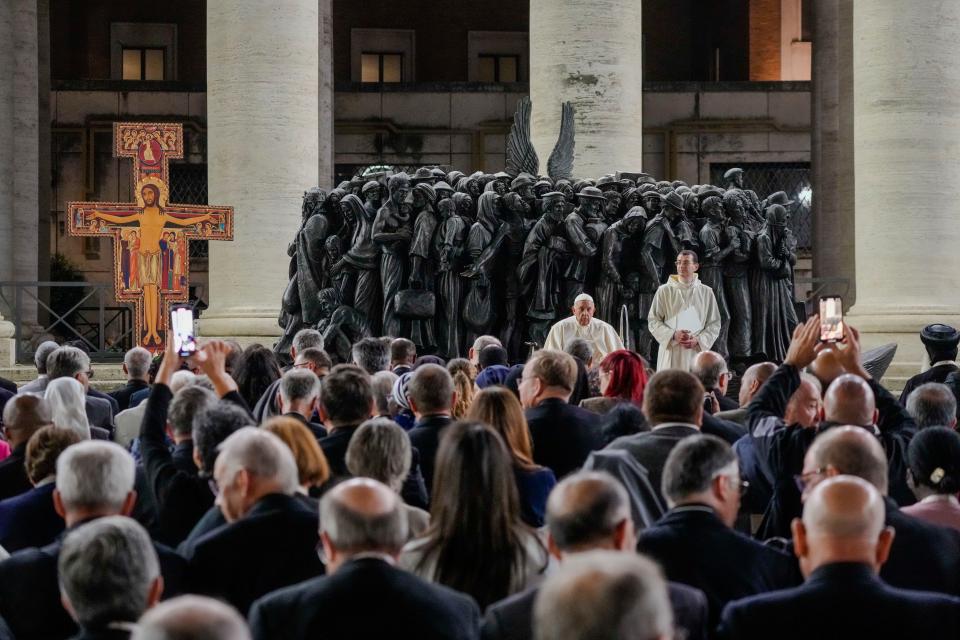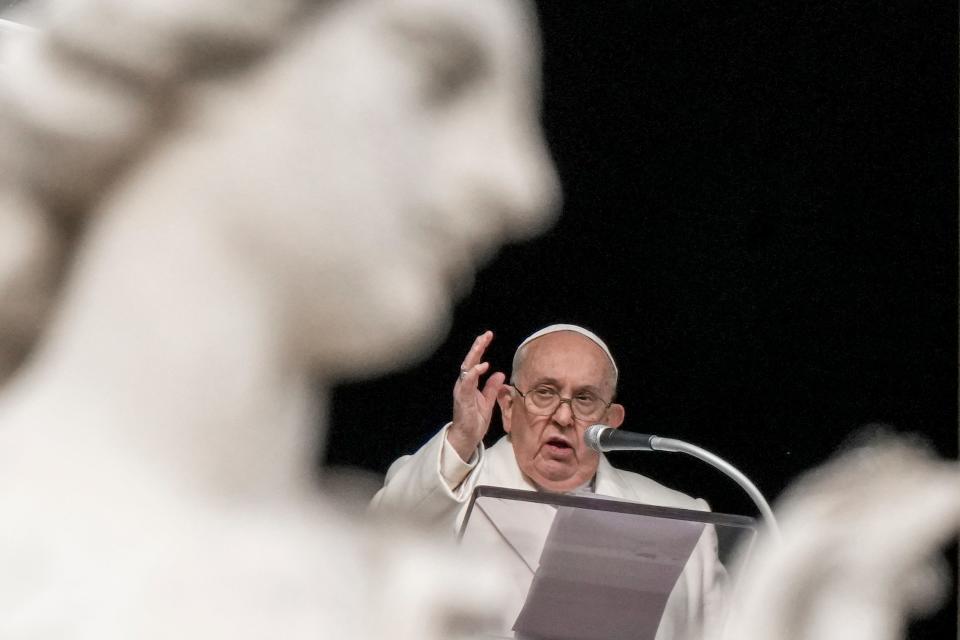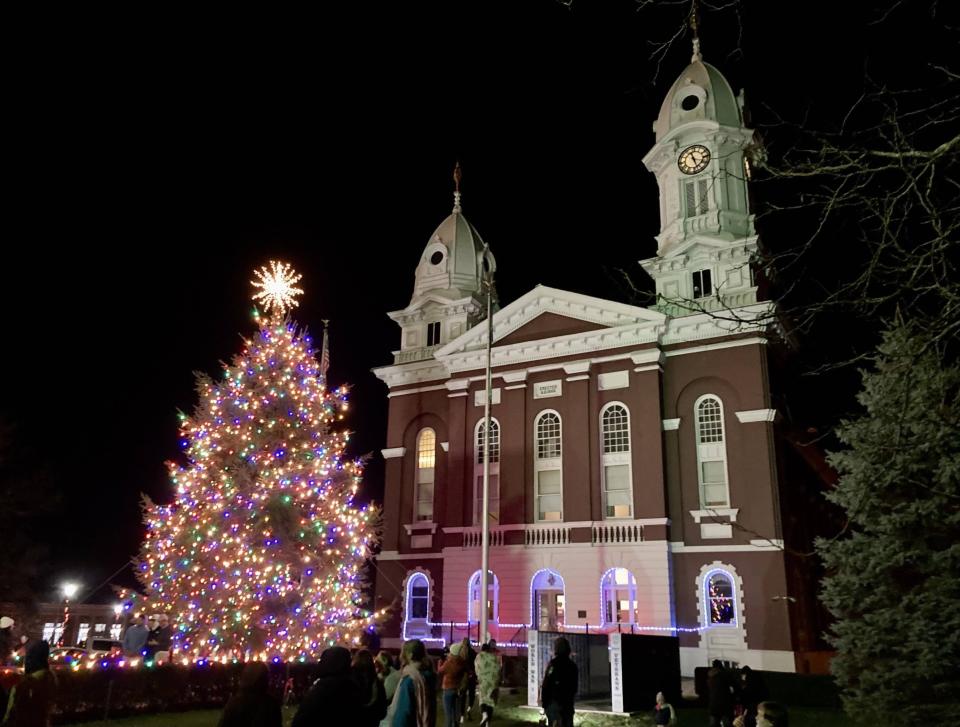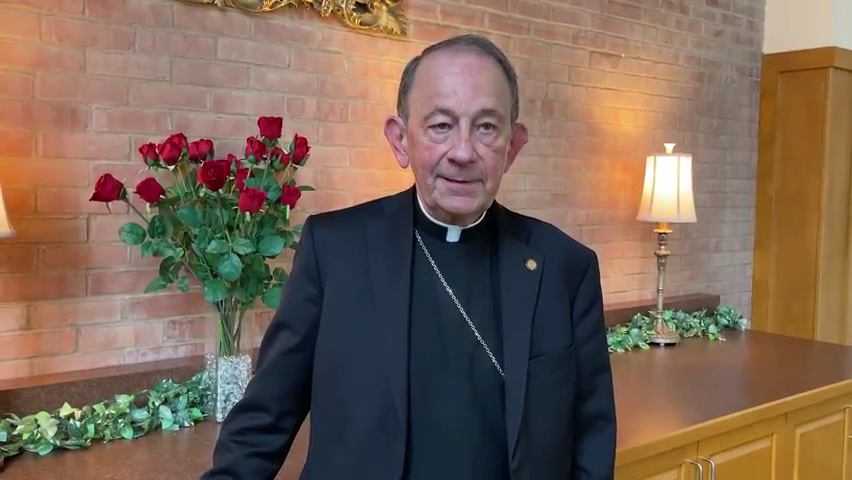It's Christmas, how to declare the good news in an age of 'vain words and chatter'?
- Oops!Something went wrong.Please try again later.
Members of the global Catholic Church — cardinals, bishops, and, for the first time, women and other non-bishop voting members — gathered this fall at the invitation of Pope Francis for an unprecedented kind of retreat. Behind closed doors at the Vatican, the diverse assembly shared, listened and prayed during the month of October as part of an ongoing, multi-year process of discernment.

The aim, according to coverage, not to force resolution of deeply divisive disputes, but guided by the Holy Spirit, to reach for a way, both old and new, of being together as a church and in history. When the session — a meeting of bishops called a synod — ended, the members then voted on a document summarizing convergences and divergences identified. It was sent back out to the people for more prayer, conversation and research in preparation for a second session in 2024.

As Thomas J. Reese, S.J. reported, "Pope Francis wants to overcome the polarization in the church so it can be a true sign and instrument of communion with God and with humanity."
A recent social media storm stirred by a Venango County parish in the Catholic Diocese of Erie underscores the importance of this reconciliatory work for the church and its mission, and ultimately, for any who seek to restore a civil, productive center of gravity to the debates that shape our lives.
As synod participants in October listened and prayed in search of a path, as Pope Francis said, "to bear witness to God's infinite love, in a better way and to everyone," a church in my hometown of Franklin went on a witch hunt.
A viral Facebook post from St. Patrick Catholic Church featuring glowing red and yellow flames proclaimed the "Deliverance from Witchcraft," as the church reached back to an era of terror and murder to counter the diabolical — at a Halloween-themed downtown shopping event.
Franklin, unlike so many of its Rust Belt small town counterparts, retains a thriving "Main Street" because leaders have worked for decades to preserve elegant Victorian architecture, cultivate niche shops, and curate a calendar of wholesome events that draw people together — for spring gardening, the apple harvest, blues and barbecue, ice carving, and the Christmas season complete with a Capraesque light parade.

Nonetheless, in October someone handling the St. Patrick Church Facebook page excoriated the Franklin Area Chamber of Commerce for organizing one of these downtown gatherings, the Witch Walk — never mind that the chamber did not organize the event — and urged Christian shop owners to express "your strong disapproval of such activities in our town."
"These witch walks are not cute, harmless, 'just for fun' events. They are coordinated efforts that lure and entice participants to participate in occult and diabolic practices," the post began.
"It's one thing to dress up and go dancing or to have a couple drinks, but when you introduce Wiccan charms, spells, and formulas like many witch walks have done and promote readings like this one in Franklin, you're crossing the line and popularizing what is evil and harmful.
"Occult practices, spiritism, divination, sorcery, black magic, ouija boards, horoscopes, fortune tellers, palm readers, tarot cards, consulting mediums, and the like, are sins of irreligion tempting God in words and deeds," it continued.
"Such actions," it said, "are diametrically opposed to the Divine law," "harshly condemned and warned against" in the Bible, and a "direct violation of the First Commandment."
In sum?
"These practices are a gateway to the diabolic and invite demonic presences into one's life, family, and home whether intended or unintended," the Facebook inquisitor concluded. The exhortation came replete with the aforementioned lurid flames, presumably of hell, but also reminiscent of those that burned "witches" alive in Jesus' name — because that was a high-water mark in the church's mission, surely.
With the post, the church announced a "Holy Hour for Deliverance" to be held at the church before the start of the Witch Walk.
The vehemence and, in some eyes, hypocrisy (given the church's own grievous faults) of the attack on a community shopping event featuring games, dancing, and yes, sample tarot card readings, immediately drew swarms of keyboard warriors to the post, pro, con and comic, before the commenting was shut down.
In the following days, St. Patrick's, citing unspecified safety concerns, announced that it had notified Franklin police and hired security forces to stand guard inside and outside the church during its deliverance ministry event.
Afterward, the parish celebrated the service as an "off-the-hook" event, which featured the pastor and his twin brother, an Army captain and chaplain dressed in military garb who came "prepared for spiritual combat." Turnout appears to have been strong, as it apparently was at the Witch Walk.
In more than two decades of courts and crime coverage in northwestern Pennsylvania, I encountered the devil's handiwork, an inexhaustible well of cruelty and corruption most unbearable to witness in crimes against children. If pastors, including Erie Catholic Bishop Lawrence T. Persico, affirm with St. Patrick Church the reality of personal evil in this world, I don't dispute it.

In a statement, Persico unequivocally validated the parish's concern: "The Catholic Church acknowledges the existence of personal evil. All religions since the dawn of humanity have. Evil is real and it can harm us," he wrote.
While most Halloween customs in the U.S. "are harmless fun," Persico said, "activities such as tarot cards, Ouija boards and psychic mediums are dangerous and are to be avoided."
That said, the bishop took care to separate the message from the medium.
"Social media," he said, deploying understatement, "is not an ideal platform to dialogue about complex issues."
Context matters.
As my colleagues Ed Palattella and Dana Massing have reported, Bishop Persico is leading a fraught, necessary pastoral effort to align diocesan resources with sacramental capacity. Parishes and schools shutter unable to withstand the combined pressures of plummeting attendance and a shortage of priests. It is part of a nationwide decline in religious participation that also affects other denominations and faith traditions and takes a toll on our social fabric — which is why we invited area pastors to share the value of religious practice for our Christmas Eve edition.
Pope Francis, for his part, confronts fissures on a global scale in a church divided ideologically by some of the same harmful forces driving wedges in our own country and families. He urges synodality (the people of God journeying together); rejection of clericalism; and theological engagement with the modern world. At the synod, he said: "Jesus' gaze…invites us to be a church that does not face today's challenges and problems with a divisive and contentious spirit but, on the contrary, turns its eyes to God who is communion….let us remember — we exist only to bring him to the world."
At such a time, what mission does it serve to raise a pastoral alarm with a digital tool calibrated to amplify anger and then humiliate with antagonistic memes the very neighbors you seek to aid? (One St. Patrick's post helpfully depicted Witch Walk participants as unwitting frogs being slowly boiled.)
ExploreVenango.com reported that no one from the church reached out to the Franklin Retail & Business Association, which hosts the event. The association — publicly rebuked in painfully close small-town quarters by a pastoral entity — was left having to defend the Witch Walk to the media as "safe." Had Witch Walk concerns been raised in person, it is hard to imagine boiling cartoon frogs would have been part of the conversation.
Some similarly strident posts on St. Patrick's otherwise warm, parish-focused Facebook page suggest modernity is not to be engaged but survived, which might explain the combative posture.
We don't have that luxury now or in any age. At the synod, Pope Francis quoted Pope Benedict XVI: "the question for us is this: God has spoken, he has truly broken the great silence, he has shown himself, but how can we communicate this reality to the people of today, so that it becomes salvation?"
To best the devil, we must restore the ability to engage one another directly with humility and compassion, not scorching social media memes, what the pope recently called a "pollution of vain words and chatter." Accusations of witchcraft did not just echo in Franklin this fall. False claims apparently rooted in a Witch's Tea fundraising event recently interfered with donations to the Fort LeBoeuf Historical Society, as Valerie Myers reported. It was just another damaging flashpoint in a never-ending cycle of suspicion and rage manufactured to distract us from true human crises and erode the tolerance we need to solve our problems and protect our comity and freedoms — including religious — in difference.
Halloween is past and for Christians, Christmas is nigh, a celebration of saving, incarnate love with a universal resonance, no matter one's faith tradition or lack thereof. Love wins, even over death. God's love, first and always, and manifested here and now by ours for each other. In this volatile era of distraction, division and distrust, how to declare that good news in a manner it can actually be heard?
The pope, echoing the openness of local pastors issuing their own invitations to faith here, offered one way in his description of the task of the synod: "to refocus our gaze on God, to be a church that looks mercifully at humanity. A church that is united and fraternal, that listens and dialogues; a church that blesses and encourages, that helps those who seek the Lord, that lovingly stirs up the indifferent, that opens paths in order to draw people into the beauty of faith. A church that has God at its center and, therefore, is not divided internally and is never harsh externally."
More: Erie pastors, if you could invite someone to attend services, what would you say?
More: Why should anyone go to church? Pastors and readers respond
Bishop Persico's statement on the St. Patrick Witch Walk controversy ended with this from Phil. 4:8: "Finally, brothers and sisters, whatever is true, whatever is noble, whatever is right, whatever is pure, whatever is lovely, whatever is admirable — if anything is excellent or praiseworthy — think about such things."
Imagine the deliverance that would occur if we only could.
Opinion and Engagement Coordinator Lisa Thompson Sayers can be reached at lthompson@timesnews.com.
This article originally appeared on Erie Times-News: Social media witchcraft tempest raises questions for Christians

